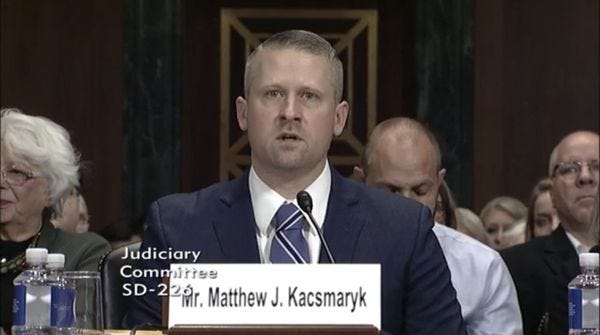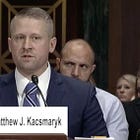
Judge Matthew Kacsmaryk has done it again!
Late on Wednesday, our least favorite US district judge in the United States issued yet another horrifying, 65-page decision related to both reproductive health care and gender-affirming care — overturning a federal law that prevents doctors and other health care providers from sharing people’s personal health information (PHI) with law enforcement in these cases.
The rule in question, Privacy Rule to Support Reproductive Health Care Privacy (aka “the 2024 Rule”) was established by the Biden-era Department of Health and Human Services in a bid to protect the private medical decisions of those who leave oppressive states like Texas in order to get a legal abortion, as well protect those who might have assisted them in obtaining it from being reported to police by a nosy neighbor in search of a payout.
In January, Dr. Carmen Purl and some other unnamed doctors, represented by the Alliance Defending Freedom — which, by sheer coincidence (not by sheer coincidence) keeps managing to get its cases in front of Kacsmaryk — filed a motion asking for a summary judgment against the rule, claiming that “it lacks statutory authority and is arbitrary and capricious.”
Dr. Purl’s claim was that the rule would hypothetically prevent her from reporting child abuse — for instance, the favorite fever dream of anti-abortion nutbars, the scenario in which someone marches the daughter they’ve been raping or the teen girl they’ve been trafficking to an abortion clinic in order to cover up their crime. It’s not clear, however, where that would come into play for Purl, a doctor who does not perform abortions or provide gender-affirming care.
The thing is, the rule did no such thing. As part of the Privacy Rule it allowed — nay, required! — doctors to provide a juvenile’s protected health information to law enforcement in the event of suspected child abuse. All doctors, nurses, and medical providers are mandatory reporters and must report any incident of suspected child abuse to the proper authorities.
Dr. Purl was also mad that the rule defined “persons” as people who have been born, and also that it was just too darn complicated for her and her office to comply with.
The lawsuit read:
The 2024 Rule’s new provisions concerning “person,” “public health,” and “reproductive health care” interfere with Dr. Purl’s ability and legal obligation
to disclose information about unborn children when they are victims of crime or
abuse, to protect unborn children from abuse, neglect, or other victimization, and to
protect an unborn child’s health and safety.For example, the 2024 Rule arguably would prevent Dr. Purl from reporting information about a patient being pressured to undergo an abortion, or about patients having received abortions in other states, or about minors under the age of 17 having a sexually transmitted disease, or about minors undergoing or being scheduled for “gender transition” interventions.
So, basically she wants to be able to report abortion as child abuse … of a fetus. And she wants to report people for having had abortions in other states, where it is legal for them to have had abortions, or getting gender-affirming care in states where it is legal for them to do so. If a parent forced their child to get an abortion against their will or there were reason to suspect a child had a sexually transmitted infection because they were being sexually abused, there is absolutely nothing in the 2024 Rule preventing her from reporting that to the proper authorities.
“Many Americans are scared their private medical information will be being shared, misused, and disclosed without permission. This has a chilling effect on women visiting a doctor, picking up a prescription from a pharmacy, or taking other necessary actions to support their health,” said HHS Secretary Xavier Becerra in April of 2024, when the rule was established. “The Biden-Harris Administration is providing stronger protections to people seeking lawful reproductive health care regardless of whether the care is in their home state or if they must cross state lines to get it. With reproductive health under attack by some lawmakers, these protections are more important than ever.”
Here’s what it did:
Prohibit[ed] the use or disclosure of PHI when it is sought to investigate or impose liability on individuals, health care providers, or others who seek, obtain, provide, or facilitate reproductive health care that is lawful under the circumstances in which such health care is provided, or to identify persons for such activities.
Require[d] a regulated health care provider, health plan, clearinghouse, or their business associates, to obtain a signed attestation that certain requests for PHI potentially related to reproductive health care are not for these prohibited purposes.
Require[d] regulated health care providers, health plans, and clearinghouses to modify their Notice of Privacy Practices to support reproductive health care privacy.
That’s a pretty reasonable rule, I’d say!
Unsurprisingly, Judge Kacsmaryk sided with Purl and friends.
The opinion begins with a quote from Justice Clarence Thomas’s opinion in Loper Bright Enterprises v. Raimondo, the case that overturned the “Chevron deference.” “Federal agencies cannot exercise powers reserved to another branch of Government,” he wrote — though we can assume Kacsmaryk would not apply that to DOGE or anything else Trump wants to do without Congress’s approval.
“The HHS errors are threefold,” he continued. “First, the HIPPA [sic] Privacy Rule to Support Reproductive Health Care Privacy (the ‘2024 Rule’) is ‘contrary to law’ because it unlawfully ‘limits’ state public health laws. Second, the 2024 Rule impermissibly redefines ‘person’ and ‘public health,’ in contravention of Federal law and ‘in excess of statutory authority.’ Third, under the ‘major-questions doctrine,’ the 2024 Rule arrogates to HHS authority not expressly delegated by Congress.”
The latter basically means that because “abortion” and “gender affirmation care” are major political issues, the HHS had no right to issue a final rule related to them without the approval of Congress (or without being Donald J. Trump, we guess).
Speaking of Trump, Kacsmaryk cited the fact that the HHS under Trump had no interest in defending the rule (thanks, RFK Jr!) as another reason for siding with the plaintiffs, as “Generally, the failure to respond to arguments constitutes abandonment or waiver of the issue.”
Kascmaryk also agreed that Congress did not give the HHS the right to define “persons” as, well, “persons” (as opposed to a “fertilized egg, embryo or fetus”) — though one could argue that the dictionary certainly does.
“In sum, HIPAA confers authority to promulgate regulations protecting individually identifiable health information. But it confers no authority to distinguish between types of health information to accomplish political ends like protecting access to abortion and gender-transition procedures,” the court wrote in its opinion in Purl v. U.S. Department of Health and Human Services. “Thus, HHS lacks the authority to issue regulations that enact heightened protections for information about politically favored procedures.” Kacsmaryk concluded. “‘[T]he people and their elected representatives’ remain free to enact their preferred protections for such procedures. And HIPAA and its regulations cannot preempt any state laws that enact ‘more stringent’ protections. But until the people speak through their representatives, agencies must fall silent on issues of abortion or other matters of great political significance. Thus, HHS lacked the authority to promulgate the 2024 Rule.”
What does this all mean? Well, it’s not good. Anti-abortion rights groups are desperate to get their grubby little hands on private health information as it concerns abortion — and we can hardly put it past Republican state governments to decide they suddenly need this information to prove that Pizzagate was real and Satanists are forcing children who have been trafficked in Wayfair cabinets to have abortions in order to procure more adrenochrome or whatever (and then pass it on to entities who want that information for even more nefarious reasons).
It also means that this information could potentially be used to send people to prison or be forced to pay fines to their neighbors for having helped someone get an abortion … and it probably will.
PREVIOUSLY ON WONKETTE!

Will Judge Matthew Kacsmaryk Outlaw Medication Abortion Tomorrow? ¯\_(ツ)_/¯

Texas Judge Who Tried To Kill Abortion Pills Is Now Out To Kill Free Speech (For Drag Queens)

Oh Boy, The Supreme Court Is Gonna Weigh In On Abortion Again!
www.wonkette.com (Article Sourced Website)
#Nosy #Doctor #Sues #Permission #Cops #OutOfState #Abortion #Wins
